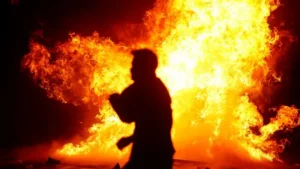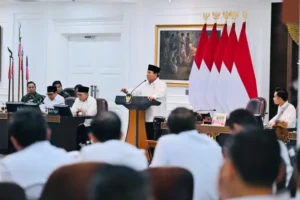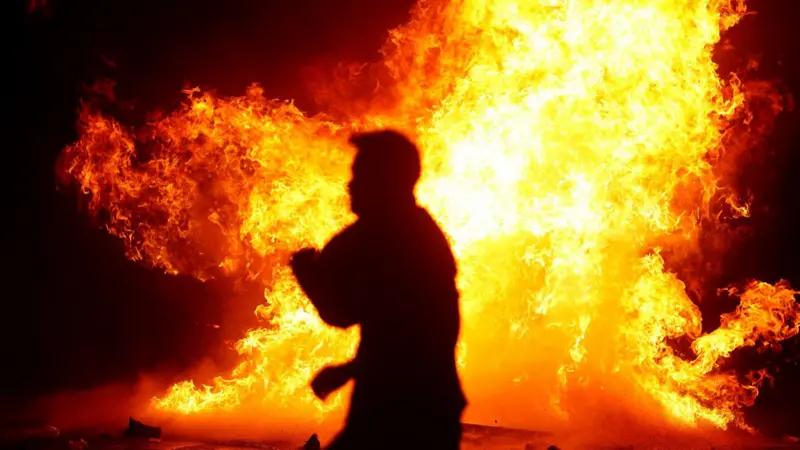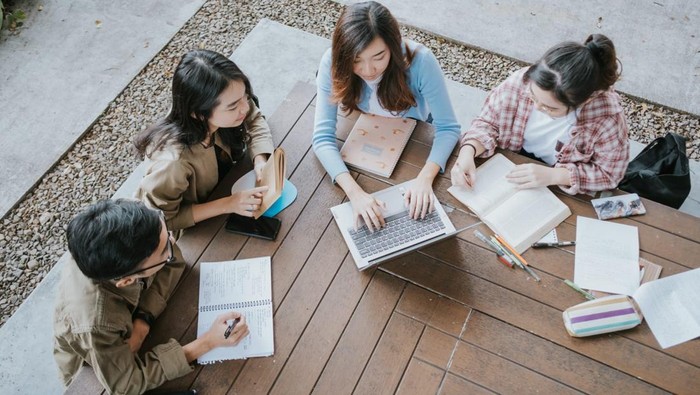Why Do Demonstrations End in Vandalism and Looting?

Hobilu.com – Monday mornings are usually the busiest in Jakarta, but September 1, 2025, was a little different. The streets were unusually quiet.
From Pasar Rebo through Cililitan, Matraman, Tugu Proklamasi to the Hotel Indonesia Roundabout, motorcycles and cars moved at a distance from each other. Some traffic lights were not working, but drivers managed themselves, patiently taking turns.
Along Sudirman-Thamrin, the roads were also empty. Members of Brimob on trail bikes, accompanied by military-plated cars, patrolled the area.
This was only a snapshot of Jakarta’s current condition after days of unending demonstrations, at least since August 25–30.

Violence and Looting Across the Country
In several parts of Indonesia, demonstrations escalated into the burning of parliament buildings and public facilities. Some people looted assets inside.
Crowds also targeted the homes of officials, looting nearly all furniture and even personal belongings such as underwear. In some areas, these actions also resulted in fatalities.
There have since been suspicions of orchestrated involvement. Republika, for example, reported signs of organized groups carrying out destruction and looting.
President Prabowo Subianto, responding to the unrest, said the demonstrations “were beginning to show symptoms of unlawful acts, even acts against the law.”
“Some are even leading towards treason and terrorism,” Prabowo stated on Sunday (31/08).
The President ordered the police and military to take “firm action.”
“I instruct the authorities to take the strictest action against all forms of public facility destruction, looting of private homes, public places, or economic centers, in accordance with prevailing law,” Prabowo said.
Still, he emphasized the government would fully respect peaceful demonstrations—as long as they do not break the rules.
Yet, social media posts continued to encourage unrest and looting.
The Role of Disinformation and Hoaxes
The Indonesian Anti-Slander Society (Mafindo) reported a surge in hoaxes circulating on social media and messaging platforms.
Examples included a video of riots in Baghdad falsely claimed to be from Jakarta, or alleged looting at the DPR building and Atrium Senen Mall.
“Some hoaxes now use artificial intelligence deepfakes, making it difficult for the public to quickly identify what’s real. People are being misled by these deepfakes,” said Mafindo’s chair, Septiaji Eko Nugroho.
What Triggered the Demonstrations?
Political researcher Virdika Rizky Utama of PARA Syndicate said the protests since August 25 were not spontaneous explosions, but the result of long-accumulated grievances.
He noted a series of events leading up to the protests:
-
President Prabowo awarding honors to officials, including individuals once entangled in corruption cases.
-
Lawmakers receiving salaries and allowances of more than Rp100 million while citizens complained about the economy.
Statements from some parliament members further inflamed anger online.
Meanwhile, central government budget cuts hit local governments, which had long relied on central transfers. To compensate, local governments raised taxes on residents, sparking protests in Pati Regency and other regions.
“The state no longer sides with the people, but celebrates on their suffering. When formal channels are closed and basic needs soar, people no longer speak through formal means. They take to the streets,” Virdika said.
However, he noted the protests’ focus shifted.
“There are layers that cannot simply be explained as civilian anger,” he added.

Oddities and Speculations
Looting of officials’ homes, bus stop burnings, and the use of Molotov cocktails raised questions about the protests.
One striking oddity: the looting of Finance Minister Sri Mulyani’s Bintaro home—twice—without significant security.
“The public notices these things. When someone of Sri Mulyani’s stature can be looted without protection, speculation about who orchestrated, allowed, or benefited becomes unavoidable,” Virdika said.
He reminded that patterns of riots and looting were not new. In May 1998, unidentified groups escalated unrest beyond public demands.
“The aims can vary: to justify intervention, to discredit civil movements, or to open space for political actors at the margins of power,” he explained.
He added that today’s unrest may be designed to shift narratives:
“So that people’s demands drown in smoke and shattered glass. So that the state has justification to act more harshly. So that civil space can be frozen in the name of order.”
“I fear the President’s accusations of treason and terrorism could justify repression.”
Protests Continue Nationwide
Nevertheless, demonstrations with clear demands continued on Monday (01/09) in Padang, Jakarta, Bandung, Palopo, and Ambon.
In Jakarta, hundreds of students under the Gerakan Bersama Rakyat (Gemarak) rallied at the DPR building.
They demanded the release of detained demonstrators, police reform, passage of asset confiscation, domestic worker protection, and indigenous peoples’ bills. They also rejected revisions to land, criminal procedure, and agrarian bills, as well as national strategic projects (PSN).
They called for justice in the death of protester Affan Kurniawan.
In Bandung, students burned tires outside the West Java DPRD, under the Cipayung Plus alliance.
“We respect President Prabowo Subianto’s speech, and we are here to hold him accountable for his words,” said student Amanda Rinjani.
Political Responses
On Sunday (31/08), President Prabowo met party leaders at the palace.
He said they agreed to take strong measures against parliament members who caused public uproar—ranging from stripping memberships, cutting allowances, to a moratorium on foreign work trips.
Prabowo stressed lawmakers must be sensitive to public aspirations and side with the people. He affirmed freedom of speech is guaranteed under both the UN International Covenant on Civil and Political Rights and Indonesian law, provided protests remain peaceful.
However, the Indonesian Civil Society Coalition of pro-democracy groups dismissed his speech as “failing to understand the political, social, and economic crisis.”
They highlighted deeper issues:
-
Waste of public funds and corruption amid hardship.
-
Excessive salaries and perks for lawmakers and state-owned enterprise directors far above citizens’ average incomes.
-
Reckless budget policies, tax burdens, and land/resource exploitation through government projects and investments.
The coalition called government solutions “false or misleading.”
In a statement, YLBHI director M. Isnur said the president failed to guarantee free expression in line with human rights standards.
“Instead, Prabowo steered towards repression by labeling demonstrators as treasonous and terrorists. This endangers the entire nation and people’s lives,” the coalition wrote.
They demanded an independent investigation led by Komnas HAM with civil society groups and experts to uncover alleged violence and unrest.

